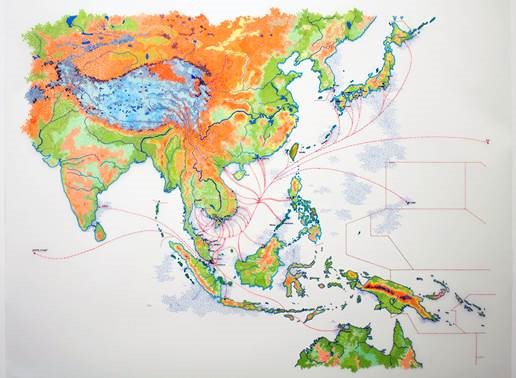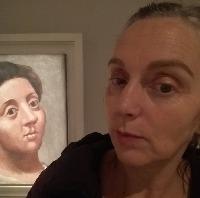Patricia Sleeman is Archivist (Electronic) at UNHCR in Geneva, Switzerland
 Tiffany Chung’s reconstructing an exodus history: boat trajectories in Asia, 2017
Tiffany Chung’s reconstructing an exodus history: boat trajectories in Asia, 2017
To be a digital archivist in UNHCR is interesting, challenging and inspiring all at once. To be part of an organization whose staff are often at the coalface of conflicts and operations which are concurrently taking place all over our world, witnessing the misery of displaced people is a unique experience. A privileged one.
Parallel to this is the constant need to justify the archives and how they support UNHCR and its mandate. Running on minimal resources my colleagues run an impressive range of services: Reference and preservation; Records management both of paper and digital records and (the reason I am here) to bring in Digital Preservation.
Arguing the case for Digital Preservation was an interesting one. How could you argue for investment in such a system in the face of cold hard facts of shortages for refugee protection? Here is one argument: 4 million refugee children do not have access to education.
Read and watch the following report by our current High Commissioner-
‘In early July, I travelled to the Kutupalong refugee settlement in Bangladesh, which has become home to hundreds of thousands of Rohingya refugees who have fled horrific violence in Myanmar. In a one-room learning centre, with the monsoon rains hammering on the roof, I saw girls and boys learning the basics of reading, writing and maths for just two hours a day, before another group took their place, and then another. It was heart-rending to watch this faint semblance of the proper schooling to which these young refugees are entitled. But it also made it abundantly clear just how highly they value education. Without it, their future, and eventually the future of their communities, will be irrevocably damaged. Half of the world’s refugees are children. ‘ In summary - Education is not a luxury. It is a right.
So in light of this and the fact that 61% of children do not go to school and that two thirds of those who finish primary school do not make it to secondary school, it is necessary that we have the business case for digital preservation water tight.
I am inspired by a tale of the archivists, a group of students, researchers, and librarians gathered in a nondescript building in a University campus, against a backdrop of pelting rain.The group had organized in protest. But, instead of marching and chanting, participants were there to learn how to “harvest,” “seed,” “scrape,” and ultimately archive websites and data sets related to climate change.The need for such work was clear. Official statements on anthropogenic, or man-made, climate change have started to vanish from official websites in countries where man-made climate change is not accepted.
The risks to digital information about refugees are similar, distortion and deletion and various forces who wish to portray displaced people as threats as opposed to them being people like us fleeing war and persecution. Theirs is a story that often will be told by someone else. Even in UNHCR we are defining the story as we document their journey across the many lands on their path escaping war and persecution.
When refugees are being portrayed negatively by the right wing press, telling the story and protecting the archive has to be of paramount importance. Refugees are able to tell their own narratives through various mediums as is witnessed through the Stories section of the UNHCR website and the interesting asylum archive project http://www.asylumarchive.com/
My Uncle was a refugee during WW2; he spoke little of his past until close to his death. His family was aware that he had never thrown anything away, and his office was piled high with papers and paperwork. After his death, his daughter discovered amongst all the more recent paperwork an attaché case full of memorabilia of his previous life. Some of his family were killed and he had rebuilt his life in a foreign country but despite it all, he had kept these documents.
Now faced with a different world, where we operate and live in a digital world, the data which documents the refugee experience is subject to many threats – deletion, loss, software and hardware obsolescence, lack of metadata, the list goes on (as we know in this community).
So we have to protect the representation and truth of the refugee experience even more carefully. We have to protect the representation and truth of the refugee experience even more carefully.
So in a call to arms and action and in recognition of our power as archivists as gate keepers and protectors of information of the vulnerable, the weak and displaced - to paraphrase: ‘Access to information, in the near and long term is not a luxury. It is a right’.
